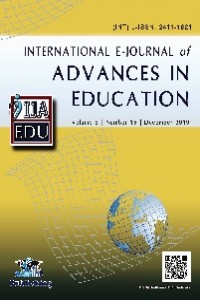Abstract
References
- Johnson, W. L., Rickel, W. J., Lester, C. J. (2000). Animated Pedagogical Agents: Face-to-Face Interaction in Interactive Learning Environments. International Journal of Artificial Intelligence in Education, Vol. 11. Pp. 47-78. http://citeseerx.ist.psu.edu/viewdoc/download?doi=10.1.1.7.7812&rep=rep1&type=pdf Oakes, H. E. (2007). Encyclopedia of World Scientists. New York: Infobase Publishing – 852 p. Konstantinov, N. N., Minahin, V. V., Ponomarenko, V. Yu. (1974). Programma, modeliruyushhaya mexanizm i risuyushhaya multfilm o nem. Problemy kibernetiki. Vol. 28. Pp. 193-209. Vasilyeva, T. V., Vlasov, E. A., Rudenko-Morgun, O. I. (1991). Case Detective. – Langsoft LTD, Inbound Trade, INC. Watters, A. (2016). Clippy and the History of the Future of Educational Chatbots. Hacked Education. Retrieved from http://hackeducation.com/2016/09/14/chatbot (the accessed date: July 17, 2019). Rudenko-Morgun, O. I., et al. 1C: Shkola. Russkij yazyk, 5-6 klass. Morfologiya. Orfografiya (2006). – Moscow: "1C-Publishing". Lester, J. C., Conversez, S. A., Kahlerz, S. E., Barlow, S. T., Stone, B. A., Bhogal, R. S. (1997). The persona effect: Affective impact of animated pedagogical agents, In Pro- ceedings of international Conference on Human Factors in Computing Systems(pp. 359- 366), CHI ’97. ACM Press, New York, NY. Baylor, A. L. (2000). Beyond butlers: Intelligent agents as mentors, Journal of Educa- tional Computing Research(pp. 373-382), Vol 22(4). Conati, C., Zhao, X. (2004). Building and Evaluating an Intelligent Pedagogical Agent to Improve the Effectiveness of an Educational Game, In Proceedings of the 9th interna- tional Conference on intelligent User interface, IUI ’04, ACM Press, New York, NY. Dormehl, L. (2017) AI assistants will soon recognize and respond to the emotion in your voice. Digital trends. Retrieved from https://www.digitaltrends.com/cool-tech/affectiva-emotion-in-voice/ (the accessed date: August 07, 2019). Al-Kaisi, A. N., Arkhangelskaya, A. L., Rudenko-Morgun, O. I. (2019) Voice Assistants as a Training Tool in a Foreign Language Class”, in INTED2019 – 13th International Technology, Education and Development Conference Proceedings, IATED Academy, Valencia, 2019, pp. 1236-1246.
Abstract
Researchers and educators traditionally consider pedagogical agents as
animated talking “heads” embedded in the educational computer programs that
help to deliver the multimedia content or engage students in the learning
process. However, the authors of this
research define the pedagogical agent as a character of any kind (video-,
cartoon-character, or even a non-interactive book-character) that helps
students to learn. The educational function is the crucial feature of any
pedagogical agent, according to authors. Thus, in this article, they describe
the different types of pedagogical agents they have created and used in
teaching language, particularly Russian as a foreign language for the last 15
years of their work. Any teacher can quickly implement most of these
pedagogical agents’ types in his/her lessons since they do not require the
knowledge of programming and computer design. The pedagogical agents described
by authors in this research have proven their efficiency during the
experimental training in multinational and diverse level groups of
international students who studied the Russian language at RUDN University
(Moscow, Russia).
Keywords
Teaching foreign languages teaching Russian as a foreign language teaching and learning tools and pedagogical agents
References
- Johnson, W. L., Rickel, W. J., Lester, C. J. (2000). Animated Pedagogical Agents: Face-to-Face Interaction in Interactive Learning Environments. International Journal of Artificial Intelligence in Education, Vol. 11. Pp. 47-78. http://citeseerx.ist.psu.edu/viewdoc/download?doi=10.1.1.7.7812&rep=rep1&type=pdf Oakes, H. E. (2007). Encyclopedia of World Scientists. New York: Infobase Publishing – 852 p. Konstantinov, N. N., Minahin, V. V., Ponomarenko, V. Yu. (1974). Programma, modeliruyushhaya mexanizm i risuyushhaya multfilm o nem. Problemy kibernetiki. Vol. 28. Pp. 193-209. Vasilyeva, T. V., Vlasov, E. A., Rudenko-Morgun, O. I. (1991). Case Detective. – Langsoft LTD, Inbound Trade, INC. Watters, A. (2016). Clippy and the History of the Future of Educational Chatbots. Hacked Education. Retrieved from http://hackeducation.com/2016/09/14/chatbot (the accessed date: July 17, 2019). Rudenko-Morgun, O. I., et al. 1C: Shkola. Russkij yazyk, 5-6 klass. Morfologiya. Orfografiya (2006). – Moscow: "1C-Publishing". Lester, J. C., Conversez, S. A., Kahlerz, S. E., Barlow, S. T., Stone, B. A., Bhogal, R. S. (1997). The persona effect: Affective impact of animated pedagogical agents, In Pro- ceedings of international Conference on Human Factors in Computing Systems(pp. 359- 366), CHI ’97. ACM Press, New York, NY. Baylor, A. L. (2000). Beyond butlers: Intelligent agents as mentors, Journal of Educa- tional Computing Research(pp. 373-382), Vol 22(4). Conati, C., Zhao, X. (2004). Building and Evaluating an Intelligent Pedagogical Agent to Improve the Effectiveness of an Educational Game, In Proceedings of the 9th interna- tional Conference on intelligent User interface, IUI ’04, ACM Press, New York, NY. Dormehl, L. (2017) AI assistants will soon recognize and respond to the emotion in your voice. Digital trends. Retrieved from https://www.digitaltrends.com/cool-tech/affectiva-emotion-in-voice/ (the accessed date: August 07, 2019). Al-Kaisi, A. N., Arkhangelskaya, A. L., Rudenko-Morgun, O. I. (2019) Voice Assistants as a Training Tool in a Foreign Language Class”, in INTED2019 – 13th International Technology, Education and Development Conference Proceedings, IATED Academy, Valencia, 2019, pp. 1236-1246.
Details
| Primary Language | English |
|---|---|
| Journal Section | Research Article |
| Authors | |
| Publication Date | January 7, 2020 |
| Submission Date | October 29, 2019 |
| Published in Issue | Year 2019 Volume: 5 Issue: 15 |
Cited By
The problem of motivational support in teaching the Ukrainian language
SHS Web of Conferences
Sergey Yekimov
https://doi.org/10.1051/shsconf/20219404002
Published and Sponsored by OCERINT International © 2015 - 2025
Contact: ijaedujournal@hotmail.com
International E-Journal of Advances in Education by IJAEDU is licensed under a Creative Commons Attribution-NonCommercial 4.0 International License. Permissions beyond the scope of this license may be available at http://ijaedu.ocerintjournals.org


